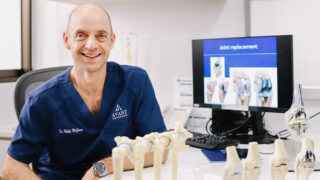DR ASWINI BALACHANDRAN is an obstetrician and gynaecologist in Singapore. Based at Raffles Hospital’s women’s health clinic, she also specialises in urogynaecology, including advising women on prolapse, a condition that has long been shrouded in silence or even shame. Find out more below, and also hear about prolapse treatment options.

What is urogynaecology?
It’s a subspecialty that focuses on pelvic floor disorders in women. A urogynaecologist is a gynaecologist with advanced training in pelvic floor medicine and reconstructive surgery.
What is the pelvic floor and what are some medical issues women can have with it?
The pelvic floor is a group of muscles and ligaments that support the bladder, bowel and womb. Damage to this area can cause conditions like prolapse of the womb, bladder or bowel, as well as issues such as urinary incontinence and recurrent urinary tract infections (UTIs).
A pelvic organ prolapse occurs when pelvic organs slip down into or out of the vagina. Nearly half of women above the age of 50 have some degree of vaginal prolapse.
What are some prolapse symptoms?
It can be a feeling that something is dropping down in your vagina – an unwelcome dragging sensation – or a feeling of a lump or bulge in the vagina on walking and sitting. Some women may feel discomfort during sexual intercourse or experience difficulty inserting tampons.
While not life-threatening, these symptoms can lead to discomfort and sexual dysfunction and often adversely affect quality of life.

What are some of the causes?
- Pregnancy and childbirth: the weight of the pregnancy and vaginal birth is associated with damage to the pelvic floor muscles.
- Menopause: the reduction of oestrogen results in alteration of the strength of the pelvic floor.
- Collagen disorders: these have a genetic component that alters ligament structure, making it laxer and more prone to prolapse.
- Obesity: increases the pressure on the pelvic floor.
- Chronic constipation and cough: these place repeated strain on the pelvic floor.
What prolapse treatment should a gynaecologist in Singapore offer?
The goal of urogynaecology is to improve the overall quality of life and is based on the severity, type and position of the prolapse as well as the desire for sexual function and fertility. Your urogynaecologist will discuss the benefits and risks of all the different prolapse treatment options and create an individualised care plan.
Prolapse treatment options include lifestyle modifications such as treating coughs and constipation as well as encouraging weight loss. Pelvic floor muscle exercises can also strengthen the muscles in the area and are effective in improving symptoms in early prolapse.
Another option is a vaginal pessary. These are devices made of rubber or silicone that can be inserted into the vagina to support the vaginal walls and pelvic organs. They are a good option for women who would prefer not to have surgery. Surgery is offered if the above non-surgical options are not effective or if the prolapse is severe. This includes vaginal wall repair, vaginal hysterectomy and uterine preserving surgery. Procedures are normally performed vaginally without any cuts on the tummy or laparoscopically (keyhole surgery).
What are some key factors in helping to prevent a prolapse?
- Maintaining a healthy body weight
- Performing pelvic floor exercises daily
- Avoiding constipation by increasing dietary fibre
- Avoiding heavy lifting
- Stopping smoking
When should you see a doctor?
You should seek the opinion of a gynaecologist at a reputable women’s health clinic when your symptoms start to negatively impact your quality of life, limiting your social interactions and restricting your daily activities.
Click here for more information on Raffles Medical Group’s urogynaecology treatments.
This interview with a gynaecolgist in Singapore first appeared in the October 2024 edition of Expat Living. You can purchase the latest issue or subscribe, so you never miss a copy!
To make the most of living in Singapore, read our latest City Guide here for free!




